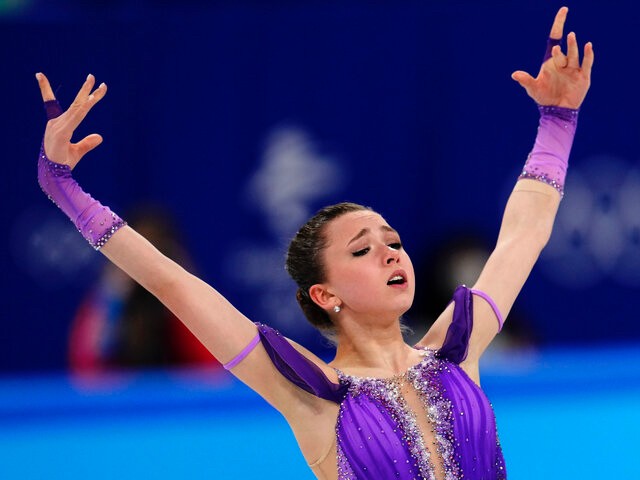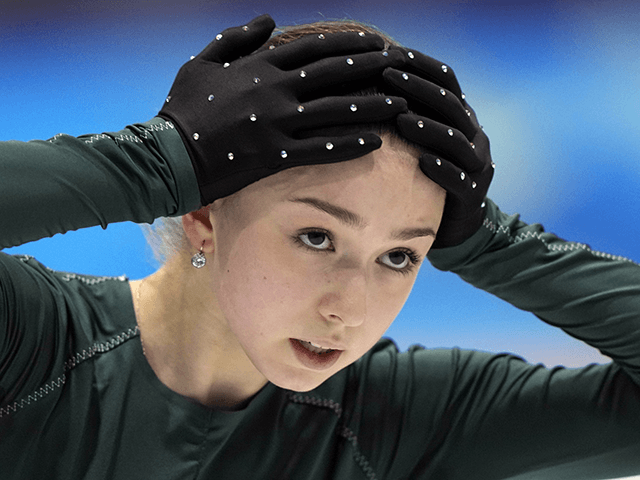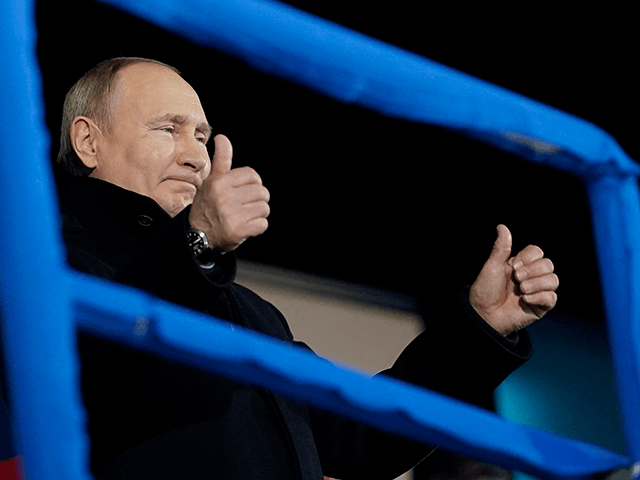The International Olympic Committee (IOC) issued an impassioned condemnation on Monday of remarks by a top adviser to Ukrainian President Volodymyr Zelensky, who accused the institution of being a “promoter of war, murder, and destruction” for ruling in favor of allowing Russian and Belarusian people to compete in its events.
The IOC – which had already implemented a “ban” on Russian athletes that allowed them to participate under a neutral flag in response to a government-sponsored doping scandal – published the results of a meeting last Wednesday on the status of Russians and athletes from Belarus. Belarusians have been largely swallowed into Russian identity in the eyes of major sporting events due to dictator Alexander Lukashenko’s support for the invasion of Ukraine. International pressure – loudest, expectedly, from Ukraine – to ban athletes from both countries from international sporting events led to the IOC meeting. At least one major international sporting event, the tennis championship at Wimbledon, banned Russian and Belarusian players last year.
At the IOC meeting, the executives who run Olympic events agreed to ban Russian and Belarusian politicians and national insignia but agreed to explore ways to allow the athletes of those countries to participate while excluding their governments. The decision outraged Ukrainian government officials, including Zelensky, who urged the total ban of Russians from sports.
In remarks on Saturday, Zelensky accused the IOC of wanting “to open sports to the propaganda influence of the terrorist state,” meaning Russia. The president called it a “matter of time” before Russia “starts using the existing unprincipled ‘flexibility’ of the International Olympic Committee to say that the world allegedly agrees to make concessions to the aggressor.”

Kamila Valieva, of the Russian Olympic Committee, competes in the women’s short program team figure skating competition at the 2022 Winter Olympics, Sunday, Feb. 6, 2022, in Beijing. (AP Photo/Natacha Pisarenko)
“There is no such thing as neutrality when a war like this is going on. And we know how often tyrannies try to use sports for their ideological interests,” Zelensky said in a subsequent address on Sunday announcing a global campaign to ensure no Russian participation in the 2024 Paris Summer Olympics.
Top Ukrainian diplomat Dmytro Kuleba responded to the decision to find a way for the athletes to play on Monday by arguing that Russia’s Olympians directly benefit from the regime of leader Vladimir Putin, and thus are inseparable from its actions.
“Russia won 71 medals in [2021] Tokyo Olympics. 45 of them were won by athletes who are also members of the Central Sports Club of the Russian Army,” Kuleba said, according to the Ukrainian state outlet Ukrinform.”The army that commits atrocities, kills, rapes, and loots. This is whom the ignorant IOC wants to put under white flag allowing to compete.”
The National Olympic Committee of Ukraine is also considering boycotting the 2024 Olympics, Ukrinform reported this weekend.
Top presidential adviser Mykhailo Podolyak issued the most strident remarks, however, and the ones the IOC condemned as “defamatory” on Monday.
“[The IOC] is a promoter of war, murder & destruction,” Podolyak wrote on Twitter. “The IOC watches with pleasure [Russia] destroying [Ukraine] & then offers [Russia] a platform to promote genocide & encourages their further killing.”
Podolyak also appeared to accuse the IOC of taking bribes from the Russian government.
“The IOC rejects in the strongest possible terms this and other defamatory statements,” the IOC said in a statement to Reuters on Monday. “They cannot serve as a basis for any constructive discussion.”
The IOC had issued a statement “on solidarity with Ukraine” on Wednesday that prompted the outpouring of indignation from Kyiv. The detailed summary of a meeting on the status of Russian and Belarusian athletes announced that the IOC had aggressed to refuse to hold its events in both countries.
“No flag, anthem, colours or any other identifications whatsoever of these countries being displayed at any sports event or meeting, including the entire venue. No Russian and Belarusian Government or State official should be invited to or accredited for any international sports event or meeting,” the statement advised.
The IOC nonetheless noted that it wished to “respect the rights of all athletes to be treated without any discrimination, in accordance with the Olympic Charter.”
“No athlete should be prevented from competing just because of their passport. A pathway for athletes’ participation in competition under strict conditions should therefore be further explored,” the statement read. To participate, Russian athletes would be required to “in no way represent their state or any other organisation in their country.”
The IOC faced pressure, contrary to that from the Ukrainian government, from the United Nations not to discriminate against Russian athletes. In a letter sent to the IOC in September, the top U.N. racism envoy expressed “serious concerns” regarding the expulsion of athletes from a competition based on their nationality.

Kamila Valieva, of the Russian Olympic Committee, puts her hands on her head during a training session at the 2022 Winter Olympics, Sunday, Feb. 13, 2022, in Beijing. (AP Photo/David J. Phillip)
We express serious concern, however, about the recommendation to ban Russian and Belarusian athletes and officials such as judges from international competitions, based solely on their nationality, as a matter of principle,” the letter read in part. “This raises serious issues of non-discrimination.”
Prior attempts to keep Russian athletes out of Olympic tournaments – as a result of violating anti-drug regulations, not the country’s nearly nine-year-old hostilities against Ukraine – have yielded poor results. An investigation into the Russian Olympics program in 2016 found that over 1,000 Russian athletes were implicated in a government-led doping conspiracy to improve their chances at global competitions. The IOC “banned” athletes from representing Russia at the Olympics and Russian athletes from attending events, but the ban did not appear to make any different in Moscow’s participation at the 2022 Beijing Winter Olympics. Vladimir Putin attended the event – as a personal guest of Chinese dictator Xi Jinping, a loophole in the ban on Russian politicians – and cheered on the “non-Russian” athletes in the stands. A 15-year-old Russian figure skater, Kamila Valieva, failed a drug test and was allowed to participate in the Games, anyway.
Follow Frances Martel on Facebook and Twitter.

COMMENTS
Please let us know if you're having issues with commenting.